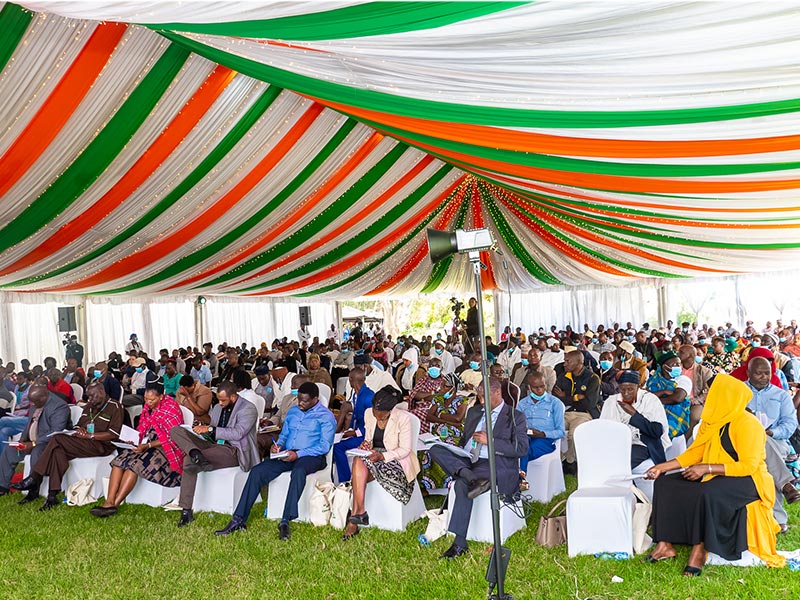
It is estimated that the ASALs support about 25% of the nation’s human population and slightly over 50% of the entire livestock population. Livestock accounts for 95 % of the family income and provides employment to 95% of the Kenyan population. However, pastoralists have continued being poor and food insecure mainly due to the effects of climate change which have resulted in low livestock productivity, women and children are the most vulnerable group, and the youth who migrate to far conflict zones in such of pasture and water for livestock. It is therefore prudent to explore alternative opportunities for pastoralist communities especially the vulnerable social groups to participate in income-generating activities, this will significantly ensure women and youth identify and recognize their untapped/ undiscovered potential in land management.
Indigenous knowledge is socio-economically viable and effective, and involves minimum risk to local communities, ideally what is required is upscaling, and value addition i.e., women groups, and youth groups are involved in nature-based solutions, which is an important asset for their livelihood as well as conserving the natural resources found in the community lands. In the pastoralist setup, structural inequalities and access to land and its natural resources persist, direct access to land through ownership cuts across the different ethnic pastoralist communities, a dynamic that deepened existing inequalities in the community. Differences in access among pastoralists have been linked to existing customary practices, gendered norms, and patriarchal traditions, which lead to the exclusion of some members in the process, especially women and youths. Realizing women’s rights to access, control, and manage natural resources remains a challenge mainly because some specific roles and relationships are regulated by socio-cultural norms which could take some time to be unlocked. The Constitution of Kenya and the Community Land Act No.27 of 2016 is an important window of opportunity in this respect since it has progressive provisions for the inclusion of women in land management issues, and it requires women to be included in the land committees and community registers, however, despite clear articulation in the law it continues to experience challenges of implementation in pastoralist landscape.
Land is a major resource for the pastoralists in providing pasture and water for the livestock, additionally, it is correct to say that indigenous peoples’ relation with their land and traditional means of subsistence is basic to and primordial to culture, social organization, and language. As far as human rights are concerned, the rights to self-determination, land, and customary land tenure and use are the most important rights for Indigenous Peoples and they should be enjoyed unconditionally by all. A common trait, the vast majority of lands that are being leased out in the thirty or so African states hosting large-scale land acquisitions do not derive from the titled private land sector but the community lands majorly owned by the indigenous peoples for mega projects, conservation, climate financing, etc. and this happens without meaningful involvement of the IPLCs.
Large land investments in the Kenyan context often have far-reaching social, economic, cultural, and political consequences since they may disrupt economic and social activities, interfere with cultural practices, reduce access to resources, displace large numbers of people, and expose the vulnerabilities of certain groups such as women. Access to community lands by investors is on the rise, several communities have existing contracts with investors others are negotiating for investments, this highlights the need for continuous legal education with the pastoralist communities; the Community Land Act of 2016 is specific as to the requirements of investments, including that each request is subject to consultation and agreement with the community, and with payment of compensation and royalties, should an agreement be reached and in addition, a community may establish requirements for the investor to conserve and rehabilitate lands. It is fundamentally important to note, most of these interventions are foreign or associated with elites within communities that routinely take disproportionate advantage of profit-seeking opportunities when externally-driven commercial opportunities arise, two-thirds of the community assembly reserves the absolute power to dispose any parcel of community land.
This influenced the decision to hold the Community Land Summit 2023 co-convened by IMPACT Kenya, the County Government of Samburu and PARAN Alliance; in collaboration with other partners under a theme that focuses on Sustainable Development Goal 5: Gender equality and participation of women and youths in land ownership, natural resource management and enhancement of sustainable local economies.The 2023 Summit builds on the success of the two subsequent Community Land Summits in Kenya held in December 2021 and November 2022 in Nanyuki Town, Kenya. It will bring together indigenous peoples, pastoralist communities, hunter-gatherers, civil society organizations, county and national government, private sector, researchers and academia, and other development partners to deliberate and dialogue on current issues in indigenous peoples’ territories ranging from Land tenure rights – the status of registration of community lands in Kenya, role of women and youth in governance; Gender equality in land ownership, use and access to investments- women and youths investment opportunities in ASALs; Women and youth involvement in conservation, eco-tourism and livestock economy; Climate financing and community resilience [carbon trading] in respect to effective benefit sharing modalities; and Free Prior and Informed Consent [FPIC] in regard to investments in community lands.The conference is planned for November 14th to 17th 2023 in Maralal TVET School, Samburu County. Plenary discussions will be organized to deliberate on the above-mentioned topics with over 200 indigenous people’s community delegates actively participating in the dialogues.
For more info:
Stand in solidarity with Indigenous peoples for land rights, sustainable livelihoods, and cultural preservation.

Karionga Village
Jua Kali Centre – Nanyuki
P.O. BOX 499 – 10400
Nanyuki
Phone:
+25 472 454 0669
+25 472 266 3090